
![]()
Search the Journey to Forever website – click HERE
|
Journey to Forever: Make a donation |
Navigation
Contact usTo Keith Addison Handmade Projects |
Appropriate technology resources
Lots of these resources are old -- some more than a century old. This is NOT because appropriate technology is nostalgic, it's because old references often contain valuable and useful information that simply is not available now.
It's not nostalgia, simply stating a fact, to recognize that a hundred years ago people were a lot more independent, had a much higher general level of practical skills, and were much less wasteful than we are today.
These old resources are a goldmine of appropriate technology. That so many of them are being reprinted today acknowledges this -- and that there's a ready market for them shows that a lot of people recognize it.
There's a growing trend among individuals in the developed countries to be more self-sufficient, less dependent on the pre-packaged infrastructure of modern society. There's a great deal in common between this movement and the need for appropriate technology solutions in the developing countries.
See also:
Appropriate technology resources for Agriculture
Appropriate technology resources for Wood
Community development
Rural development
Organizations
Practical Action (Intermediate Technology Development Group, ITDG) was founded in 1966 by Dr E.F. Schumacher, author of Small is Beautiful -- Economics as if people mattered, which is still the foundation text on a sustainable future. Practical Action is a sustainable development NGO that helps to build the technical skills of poor people in developing countries. The Practical Action Technical Enquiry Service is a free service to individuals and organizations everywhere, supporting local development initiatives with high-quality technical information and professional advice on using it. Practical Action Publishing is the world's largest publisher and supplier of books and journals on appropriate technology. The group is involved in research, technology development, field testing and commercialization, technical assistance, training, and advocacy, covering a wide range of subjects. Practical Action believes that sustainable development is achieved only if the participants in the process are its architects. Practical Action:
http://practicalaction.org/
The Development Bookshop -- browse categories, search titles, authors, ISBN, keywords:
http://developmentbookshop.com/index.php?ref=13&affiliate_banner_id=3
Practical Answers -- Technical Information Online, a wide range of Technical Briefs for downloading:
http://practicalaction.org/practicalanswers/categories.php
VITA -- Volunteers in Technical Assistance: US-based private, nonprofit, international development organization, worked for 42 years helping to empower the poor and fostering self-sufficiency in developing countries. VITA published a wide range of practical guides and how-to's, from a few pages to complete manuals of 200 pages and more, with clear instructions and easy-to-follow plans and illustrations. Useful guides on agriculture and animal husbandry, building and construction, business, industry and crafts, communication and transportation, energy, food processing, health and nutrition, stoves, ovens and kilns, water supply, natural resources, conservation. VITA publications are available in full-text free online at Alex Weir's CD3WD 3rd World Development online library -- see full list of 160 VITA publications, with direct links for online access.
CD3WD - CD 3rd World - and TWI - Third World Information -- Hosted by Alex Weir , CD3WD is a free digital collection of practical How-To Technical Development Information -- "helping the 3rd world to help itself". More than 1,700 titles in full text online, in html or pdf format. Covers agriculture, Appropriate Technology, construction, building, civil engineering, electrical trades and electronics, fisheries and fish farming, food processing and storage, post harvest, forestry, health, medicine, metalworking, soil, water, veterinary medicine, animal health, sanitation, woodwork, carpentry, and more. Sourced with permission from US, UK, German, Swiss, UN and other aid programs, NGOs and other bodies worldwide. Full list for online access (note: items marked "offline" are in fact online in pdf format):
http://www.fastonline.org/CD3WD_40/CD3WD/INDEX.HTM
Download the complete collection -- more than 4,000 titles on 44 CDs:
http://www.cd3wd.com/CD3WD/index.htm
The Nayudamma Information Bank at the International Development Research Centre (IDRC) in Ottawa, Canada, is named after the late Dr. Yelavarthy Nayudamma, a man who dedicated his life to demonstrating how science and technology can and should be used for human benefit. The Bank provides information on the technologies supported by IDRC -- technologies from the South for the South, with contact names for all the technologies described. Covers agriculture, communication and information, economics, education, energy, engineering, environment, fishery, forestry, health.
http://www.idrc.ca/nayudamma/index_e.html
Village Earth: The goal of the Village Earth Project and the Consortium for Sustainable Village Based Development is to join together with other NGOs and individuals to help connect rural villages (two thirds of the world's population) to global resources -- including energy resources, information, appropriate technologies, social and financial resources -- for self-reliant, sustainable village-based development. Publishers of the Appropriate Technology CDROM Library and the Appropriate Technology Sourcebook (see below, Resources).
http://www.villageearth.org/
Resources
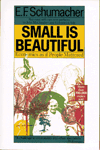 "Small Is Beautiful: Economics As If People Mattered", by E. F. Schumacher, HarperCollins, 1973, 1989, ISBN 0060916303, 324 pages. This book has sold 700,000 copies -- no small figure for a book on economics. Required reading for anyone interested in development. If it had sold 7 million copies there'd be a lot less poverty, hunger and environmental degradation in the world than there is now. Buy at Amazon.com: Small Is Beautiful
"Small Is Beautiful: Economics As If People Mattered", by E. F. Schumacher, HarperCollins, 1973, 1989, ISBN 0060916303, 324 pages. This book has sold 700,000 copies -- no small figure for a book on economics. Required reading for anyone interested in development. If it had sold 7 million copies there'd be a lot less poverty, hunger and environmental degradation in the world than there is now. Buy at Amazon.com: Small Is Beautiful
"A Guide for the Perplexed" by E. F. Schumacher, Harper, 1977, ISBN 0060906111, 160 pages. Schumacher's last book before he died in 1977, this is a roadmap to a sane future written by the man the Los Angeles Times called "one of the wisest minds of our time". Newsday called the book "nothing less than a Manual for Survival". A pleasure to read -- entirely relevant, pithy, and short. Buy at Amazon.com: A Guide for the Perplexed
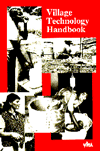 "Village Technology Handbook" Volunteers in Technical Assistance (VITA), 3rd edition 1988, Vita Publications, ISBN 0866192751
"Village Technology Handbook" Volunteers in Technical Assistance (VITA), 3rd edition 1988, Vita Publications, ISBN 0866192751
One of the best resources for development workers and for self-sufficiency. Written to bridge the technical information gap that keeps the world's villages from learning from each other's experience. Easy to read, construction plans for a wide range of useful tools, implements and techniques. Water, Health and Sanitation, Agriculture, Food Processing and Preservation, Construction, Home Improvements, Crafts and Village Industry, Communications. Also available in French and Spanish. Full text free online at CD3WD 3rd World Development online library:
http://www.cd3wd.com/cd3wd_40/vita/vthbook/en/vthbook.htm
Download complete book from CD3WD (14Mb pdf):
http://www.fastonline.org/CD3WD_40/JF/410/02-64.pdf
Appropriate Technology CDROM Library -- "The most comprehensive, practical, and economical Appropriate Technology reference collection ever compiled." Complete text and images from over 1,050 of the best books on all areas of do-it-yourself technologies ... over 150,000 pages in a digitized format, on Mac and PC compatible CD-ROMs or DVDs. Subjects covered include clean drinking water, making tools, growing your own crops, preserving crops, irrigation, reforesting a denuded watershed, starting a small fish hatchery, building a small-scale hydropower scheme, building and maintaining pumps, treating human and animal waste, improving rural cookstoves, caring for the sick, non-formal education, preparing for a natural disaster, small industries, solar / wind / water / biogas power, transport, and much more. In use in over 130 countries by development workers and relief organizations. "In a country where books are scarce, this library is an important resource indeed. Already it has some readers' minds whirling as they realize 'we can do that technology here'." -- L.F., Mennonite Central Committee, Laos. From Village Earth:
http://www.villageearth.org/pages/AT_Library/index.htm
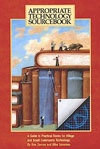 "The Appropriate Technology Sourcebook: A Guide to Practical Books for Small Community Technology" by Ken Darrow and Mike Saxenian, revised and enlarged edition, 1993, Consortium for Sustainable Village Based Development (CSVBD) ISBN 0917704185
"The Appropriate Technology Sourcebook: A Guide to Practical Books for Small Community Technology" by Ken Darrow and Mike Saxenian, revised and enlarged edition, 1993, Consortium for Sustainable Village Based Development (CSVBD) ISBN 0917704185
The Sourcebook reviews 1,150 of the best books on appropriate technology. Invaluable, practical resource on small-scale technologies. "The best AT Bibliography for those who are actually getting their hands dirty" (The Whole Earth Catalog). "The world's best village machines" (Christian Science Monitor). "The only inventory in the English language that attempts to bring together the sum total of every relatively uncomplicated device... truly comprehensive" (United Nations Development Forum). Most of the books reviewed in the sourcebook are available in full in the Appropriate Technology Library on CD-ROM or Microfiche (see above). The Sourcebook is now online! -- in full, and with a search engine, at publishers Village Earth/CSVBD:
http://www.villageearth.org/atnetwork/atsourcebook/index.htm
 Lehman's Non-electric -- "Serving the Amish and others without electricity with products for simple, self-sufficient living since 1955." Everything you need to go back to the land, from the people who never left it in the first place. Stuff here from all over the world -- German pressure lanterns, Chinese anvils, South African 3-legged cast-iron cooking pots, scythes from Austria, high-quality, along with built-to-last-forever goods made by local Amish craftsmen, lots of basic, sensible items you just don't find anywhere these days: "Products for Simple, Self-sufficient Living". Goods for the kitchen, appliances, stoves, water, lamps & lights, tools & farm, outdoors, home, plus online bookstore with books on cookery and preservation, health and nutrition, make it yourself, farming, animals, home and garden, country living, Amish and Mennonite. Order online. Site search.
Lehman's Non-electric -- "Serving the Amish and others without electricity with products for simple, self-sufficient living since 1955." Everything you need to go back to the land, from the people who never left it in the first place. Stuff here from all over the world -- German pressure lanterns, Chinese anvils, South African 3-legged cast-iron cooking pots, scythes from Austria, high-quality, along with built-to-last-forever goods made by local Amish craftsmen, lots of basic, sensible items you just don't find anywhere these days: "Products for Simple, Self-sufficient Living". Goods for the kitchen, appliances, stoves, water, lamps & lights, tools & farm, outdoors, home, plus online bookstore with books on cookery and preservation, health and nutrition, make it yourself, farming, animals, home and garden, country living, Amish and Mennonite. Order online. Site search.
http://www.lehmans.com/
Lehman's Country Life blog -- "The new and improved online simplicity village", user-powered community blog.
http://countrylife.lehmans.com/
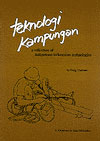 "Teknologi Kampungan -- A Collection of Indigenous Indonesian Technologies" by Craig Thorburn, 1982, Volunteers in Asia, ISBN 0917704169
"Teknologi Kampungan -- A Collection of Indigenous Indonesian Technologies" by Craig Thorburn, 1982, Volunteers in Asia, ISBN 0917704169
Third World technology for a more efficient world. Build a bamboo hand pump, spinning wheel, or potter's wheel, use bicycle parts to make a grinding wheel, wood lathe, or blacksmith's forge, construct a waterwheel electricity generator. Ideas and plans for both developing countries and people wanting to be more self-sufficient. Detailed drawings and descriptions. Agriculture, fishing and aquaculture, post-harvest processing and cooking utensils, transportation, architecture, housing and construction, small industries, handicrafts and the informal sector. Download the complete book free from the CD3WD online 3rd World library (6.4Mb pdf):
http://www.fastonline.org/CD3WD_40/JF/410/02-60.pdf
Buy the hard-copy book from Amazon.com: Teknologi Kampungan
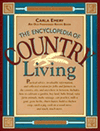 "The Encyclopedia of Country Living -- An Old Fashioned Recipe Book" by Carla Emery, 9th edition 1994, Sasquatch Books, ISBN 0912365951
"The Encyclopedia of Country Living -- An Old Fashioned Recipe Book" by Carla Emery, 9th edition 1994, Sasquatch Books, ISBN 0912365951
The homesteaders' bible -- Carla Emery published the first edition herself, more than 25 years ago, and it's since grown into an 800-page illustrated treasure of rural wisdom gleaned over the years from homesteaders and others. It's an all-embracing rural encyclopaedia, the complete resource for self-sufficient living. Grow a garden, milk a cow, catch a pig, pluck a chicken -- everything about food, growing it, storing it and cooking it, including hundreds of recipes, a wealth of practical information, detailed instructions, anecdotes, personal advice, suppliers, catalogs, books and magazines, organizations, how-to, where-to and why-to, and morsels of everything else from the highly personable Ms Emery. Buy from Amazon.com: The Encyclopedia of Country Living -- An Old Fashioned Recipe Book
"The Household Cyclopedia of General Information" compiled around 1881 by Dr. Harry Hartshorne of the University of Pennsylvania
"Practising and relearning the skills that once enabled people to live without the infrastructure our society provides -- the utilities, the shops, the readymade products -- can only be a good thing," says Matthew Spong, who has put this amazing book online. "It's the sort of book a pioneer of the old west would have packed carefully into his covered wagon before heading off for a boondock town. It was a book for people who need to be able, if the circumstances demand, to amputate a limb, grow their own fibre for material, take care of their horses, give birth to children, and build houses, concoct medicines, all with the minimum of help from others." Covers Agriculture, Horticulture, Rural And Domestic Economy, Farriery, Medicine, Culinary Arts, Brewing, Distillation, Perfumery, Bleaching And Scouring, Dyeing, Staining, Paints And Colors, Varnishes, Lacquers, Cements, Glue, Inks, Metallurgy, Pyrotechny, Tanning, Enamelling, Pottery, Glass, Photography, Engraving, Weights And Measures, Chemical Reciepts, Weather Prognostics, Angling, Miscellaneous (long!), Implements Of Agriculture, Illustrations, Index.
http://www.publicbookshelf.com/public_html/
The_Household_Cyclopedia_of_General_Information/
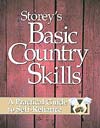 "Basic Country Skills: A Practical Guide to Self-Reliance" by Deborah Burns (Editor), 1999, Storey Books, ISBN 1580172024
"Basic Country Skills: A Practical Guide to Self-Reliance" by Deborah Burns (Editor), 1999, Storey Books, ISBN 1580172024
"What Country Folk Know that You Don't." Like how to plant a cold and flu garden to make your winter healthier and happier. A manual for everyday survival, whether in town or country, especially on gardening -- more than a third of the 544 pages are devoted to gardening. More than 150 of Storey's expert authors in gardening, building, animal raising, and homesteading share their specialized knowledge and experience. Illustrated step-by-step instructions on how to milk a cow, tap a maple tree, clean a fish, lead a horse, build the best chicken coop -- how to be skilful! Full resource list and a complete index. Buy from Amazon.com: Basic Country Skills: A Practical Guide to Self-Reliance
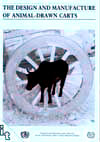 "The Design and Manufacture of Animal-Drawn Carts" by Ian Barwell and Gordon Hathway of I.T. Transport Ltd (UK), 1986, Practical Action
"The Design and Manufacture of Animal-Drawn Carts" by Ian Barwell and Gordon Hathway of I.T. Transport Ltd (UK), 1986, Practical Action
Covers different types of carts and how to build them. Photographs and line drawings. Two-wheeled carts, four-wheeled carts, tippers, bottom-dumpers, water-carriers, bodies, axles, wheels, suspension, horses, oxen, camels, harnessing and hitching, lots of detail. Most people in developing countries don't have transport. Often they don't even have roads. But planners ignore every option that doesn't have a motor. So people usually use their legs to travel, and transport goods on their backs. There are many local alternatives, but they get no support and are few and far between. This book is the first of a series by the ILO and UNCHS/HABITAT on low-cost vehicles. Animal-drawn carts have been used for hundreds of years in many countries, but there have been few attempts to explain the principles of good design or to describe suitable manufacturing methods using local materials and technologies. A few countries still have traditional cart-making skills, but most don't. Animal carts are cheap and efficient, they don't need much of a road, they're easy to build, and they're sustainable. Buy from the Development Bookshop: The Design and Manufacture of Animal-Drawn Carts
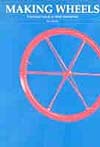 "Making Wheels: A Technical Manual on Wheel Manufacture" by R. A. Dennis, 1992, Practical Action
"Making Wheels: A Technical Manual on Wheel Manufacture" by R. A. Dennis, 1992, Practical Action
A low-cost technology for workshops to set up their own facilities and manufacture a range of wheels from standard steel sections. For those familiar with metalworking techniques. With technical drawings and sketches. Buy from the Development Bookshop: Making Wheels: A Technical Manual on Wheel Manufacture
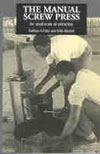 "The Manual Screw Press for Small-Scale Oil Extraction" by Kathryn H. Potts, Keith MacHell, 1993, Practical Action, ISBN 1853391980
"The Manual Screw Press for Small-Scale Oil Extraction" by Kathryn H. Potts, Keith MacHell, 1993, Practical Action, ISBN 1853391980
Manual of oil extraction from peanuts or other soft oilseeds can be a viable enterprise for small businesses. Describes small-scale processes of oil extraction for use in rural areas, as well as ways to market and distribute the oilcake. Buy at Amazon.com: The Manual Screw Press for Small-Scale Oil Extraction
"The Boy Mechanic" by Popular Mechanics Co. (from 1913 to 1925), Classic Reprint Series. "When these books were published , a major part of the population was agricultural and another major part was industrial, since the service sector had not yet become as significant as it is today. Both groups were familiar with tools and there was an assumed practical knowledge level that does not exist today. Published in that wonderful era of our history when people were much more independent and tended to make things rather than buy them, the four books have 3,849 articles and 3,917 illustrations for thousands of projects using new or recycled materials." These books were handed down from generation to generation. Not just for boys! Buy at Amazon.com:
The Boy Mechanic: 200 Classic Things to Build
The Boy Mechanic: Best Projects from the Classic Popular Mechanics Series
The Boy Mechanic: 700 Things for Boys to Do
The Boy Mechanic, 800 Things for Boys to Do (1919)
Popular Mechanics Shop Notes Series, 1905 to 1921, Classic Reprint Series. Popular Mechanics began issuing their Shop Notes in 1905 as an annual collection of advice on jigs, fixtures, methods of work, processes and projects. The subheading for the titles, "Easy Ways to Do Hard Things", accurately describes the contents. The earlier issues had more emphasis on metalworking than woodworking but the focus was always on small shop practice. As years went by, the contents shifted more and more to woodworking and handyman projects. The advice is always direct and simple, using the tools available in a normal home shop. Clear, concise, and widely informative. The notes are profusely illustrated -- the early years have excellent line drawings and engravings, with some photographs only after 1920. Lee Valley Tools has reprinted issues 1905 to 1930.
http://www.leevalley.com/wood/page.aspx?
c=3&p=42563&cat=1,46096,46100
Home Power magazine focuses on home-scale renewable energy and solar power -- current issue (free download), files and downloads, educational resources, two sets of Web resources: Renewable Energy (RE) sites links, and Other links, and products: Solar2, Solar3, and Solar4 CD-ROMs, books, videos, back issues.
http://www.homepower.com
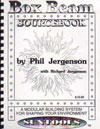 "Box Beam Sourcebook" by Phil Jergensen, 1994, Suntools, ISBN 9994777866
"Box Beam Sourcebook" by Phil Jergensen, 1994, Suntools, ISBN 9994777866
How to build modular shelter, greenhouses, furniture, many kinds of electric vehicles, a mini-tractor, wind generator, solar concentrator, and much more. Make everything from your bed to a portable home to an electric vehicle with components you can recycle yourself thousands of times. A revolution in building design and construction -- cheap, versatile, and easy. Anyone can use these simple methods and designs, save hundreds of dollars, and build things to their exact specifications. "Appropriate technology at its best." Buy from Amazon.com: Box Beam Sourcebook
Appropriate technology
Appropriate technology resources
- Agriculture resources
- Wood resources
Blacksmithing
Wood fires that fit
Houses that fit
Water-powered water pumps
Journey to Forever and AT
- Chinese watering cans
- Handmade Projects watering can plans
- Hoe for victory!
- Billhooks and sickles
A better rat trap
- Rats and owls
- Chinese rat trap
- How to make a Chinese rat trap
- Bucket rat trap
Appropriate technology subjects